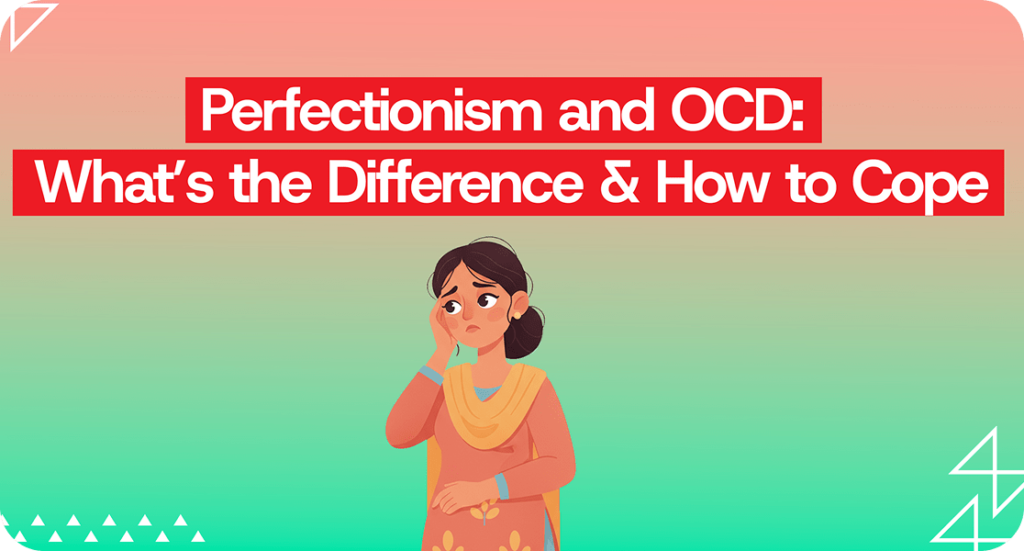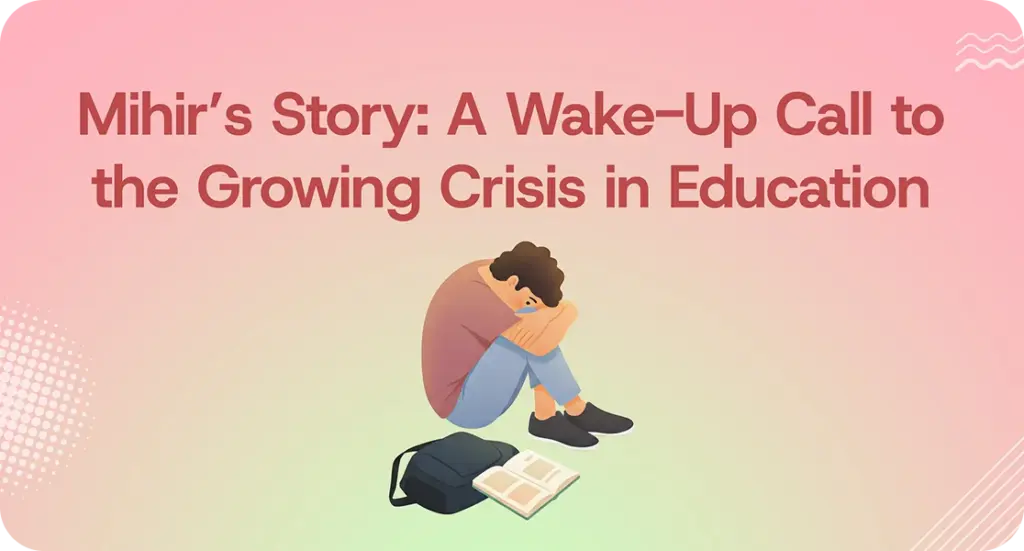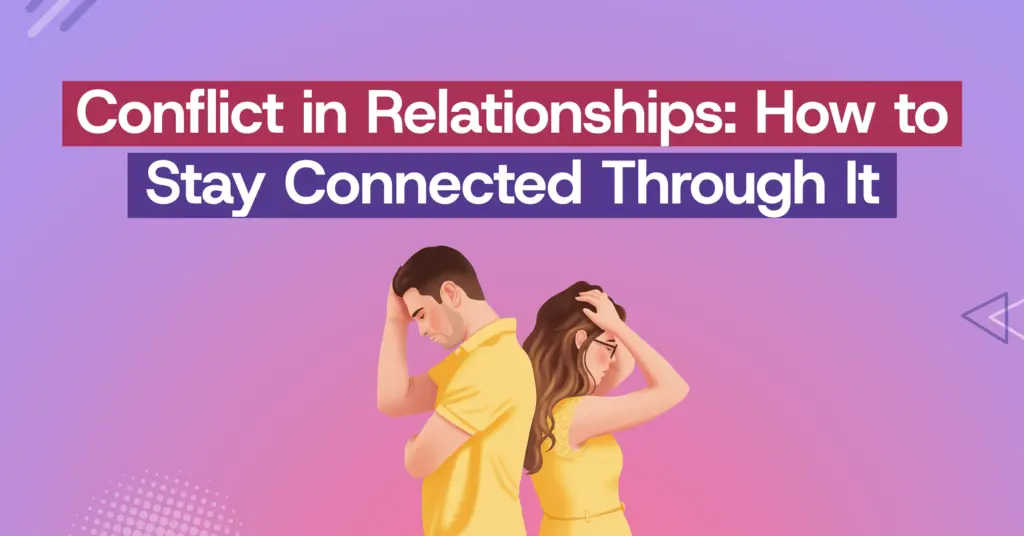
Need to Talk to Someone?
How to Manage Conflict in a Relationship
- Say you don’t understand them and create issues?
- Show no respect for your time?
- Behave without any regard for your feelings?
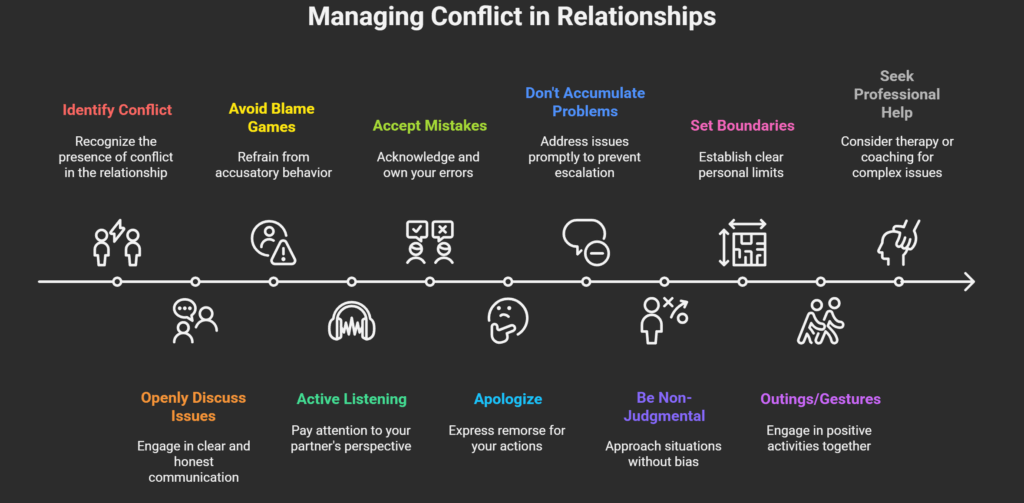
1. Openly Discuss Issues:
- In many relationships, open communication doesn’t always happen. Communication can sometimes be verbal or non-verbal.
- If you can’t express your issues, dislikes, insecurities, and discomforts clearly with your partner, it can gradually lead to bigger problems
- In some cases, silence can also be a way of conflict resolution. This kind of communication can help find the root cause of the issue and resolve other matters.
2. Avoid blame games:
- When issues arise, it’s essential to discuss matters openly and accurately without mutually blaming each other. What’s needed is to understand what’s happening and how you feel.
- In many cases, starting with accusations and criticisms like “You’re the reason,” “It’s all your fault,” or “If you hadn’t done that, this wouldn’t have happened” only helps to escalate the magnitude of the problem that occurred.
3. Active listening:
- As mentioned earlier, it’s crucial to discuss issues openly and accurately when they arise. Similarly, it’s equally important to listen attentively to what your partner is saying.
- Active listening helps you understand the issue accurately and also makes your partner feel heard
4. Accept mistakes:
- Issues may arise due to one person’s or both partners’ mistakes in a relationship. It takes time to understand whose fault it is and the exact reason.
- However, we’re often unwilling to accept our mistakes or correct them. Instead, we tend to defend ourselves and think, “It’s not my fault.
- Being open to accepting our mistakes and changing them strengthens the relationship.
5. Apologize:
- When a conflict arises, understanding the reason behind it and whose fault it is, then apologizing is not wrong in a relationship.
- Most often, our ego doesn’t allow it. Mutual understanding and adjustments are necessary in a relationship. Therefore, apologizing when realizing one’s mistake is the better option. It helps the relationship move forward smoothly.
6. Don't accumulate problems:
- Most often, our ego doesn’t allow it. Mutual understanding and adjustments are necessary in a relationship. Therefore, apologizing when realizing one’s mistake is the better option. It helps the relationship move forward smoothly.
7. Be non-judgmental:
- Being judgmental in any relationship, not just romantic ones, can ruin the relationship.
- It’s best to be unbiased and not have preconceived notions. When you understand your partner accurately and without bias, conflicts decrease. Conversely, behavior with such preconceptions can sometimes lead to bigger issues.
8. Do Not Show Contempt for Your Partner:
- Contempt, disdain, and ridicule can lead to significant problems in a relationship.
- According to Gottman,Contempt is often cited as the biggest predictor of divorce.
- Showing contempt for your partner, speaking to them disrespectfully, not showing mutual respect, uncomfortable silences, name-calling, and non-verbal gestures like rolling your eyes are all included. Avoiding such behavior helps prevent conflicts in relationships.
9. Set Your Boundaries:
- Creating and maintaining healthy relationship boundaries is beneficial. Creating and maintaining comfortable boundaries by understanding your and your partner’s interests, preferences, and dislikes can help avoid major issues in relationships.
- Communication is key to establishing and maintaining such boundaries
10. Outings/Gestures:
- After resolving conflicts or naturally in a relationship, going out with your partner and showing gestures of care can bring significant changes.
- When you go out, you move away from that negative atmosphere and set a positive environment where you can communicate openly and be positive.
- Here, gestures like hugging, kissing, and saying ‘I love you’ all have a positive effect.
11. Seeking Professional Help
- Couples Therapy: A joint therapy session with your partner, focusing on relationship dynamics and communication. if you are searching for an affordable option, then Oppam is your perfect choice.
- Individual Therapy: One-on-one sessions to address personal issues, which can, in turn, benefit your relationship. Book a session for counseling.
- Relationship Coaching: A more goal-oriented approach, helping you develop strategies to improve your relationship.
- Online Therapy: Convenient online sessions, ideal for those with busy schedules or preferring the comfort of their own space. Choose Oppam for best online therapy
How to Manage Relationship Arguments: A Guide to Managing Conflicts
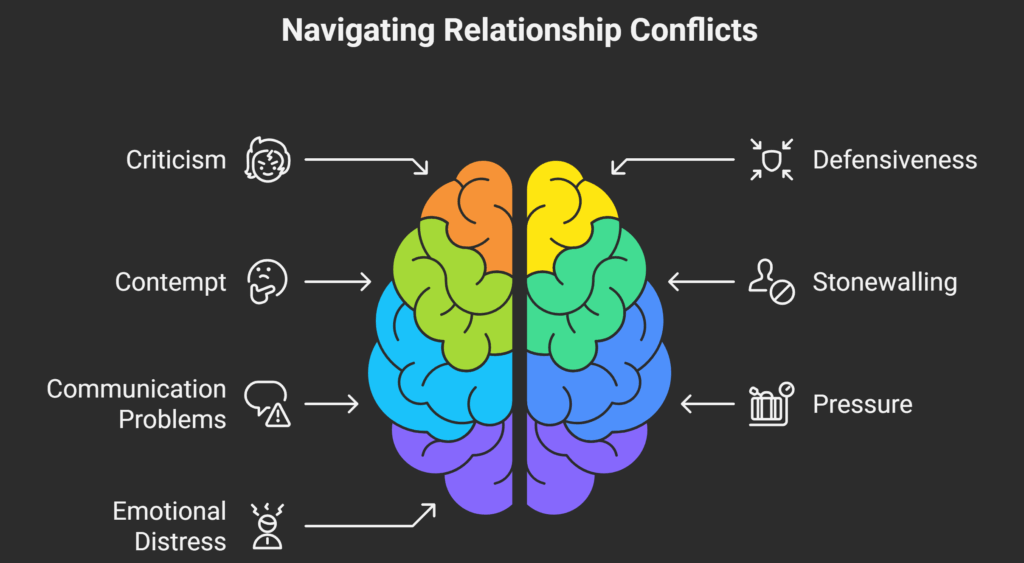
- Criticism: Attacking your partner’s character, habits, or values.
- Defensiveness: Becoming overly defensive and dismissive of your partner’s concerns.
- Contempt: Showing disdain, mockery, or disrespect towards your partner.
- Stonewalling: Refusing to engage in conversation, shutting down, or becoming unresponsive.
Causes of Arguments
Problems in communication:
- If issues in communication are not addressed properly, it can lead to many misunderstandings in a relationship. Gradually, these can lead to bigger problems.
- It’s essential to openly discuss feelings, issues, dislikes, likes, and boundaries in a relationship. Many relationships fail due to a lack of proper communication.
- When two people are involved in a relationship, they usually have different ideas, perspectives, likes, and dislikes. If these are not openly discussed, it can lead to misconceptions
Pressure From Various Things:
- In a relationship, it’s normal to have pressure from various things, but it’s essential for the individuals in the relationship to be healthy to move forward positively.
- Many people experience various pressures, both professionally and personally. In many situations, it’s not possible to express or understand these pressures. Therefore, the possibility of arguments in relationships is higher.
Emotional Distress:
- In some situations, your partner’s actions or words can cause emotional distress, breaking you down.
- Sometimes, your partner may not be aware of the emotional turmoil they’re causing you. Often, you may not be willing to openly discuss these issues. This can gradually lead to bigger problems.
Are you Accumulating Old/Small Conflicts?
- Such situations are common in many relationships. When past issues are repeatedly brought up in present life, it can create significant discomfort.
- Even small problems need to be addressed in a relationship; otherwise, they can lead to bigger issues.
- When small problems are openly discussed, the bond between partners in a relationship becomes stronger
Having Unrealistic Expectations:
- Having unrealistic expectations in a relationship can lead to many problems. Often, your partner may not be able to fulfill the expectations you imagine, or even come close to it.
- This can create significant discomfort and dissatisfaction. Sometimes, your partner may feel pressured trying to meet your expectations, which can be overwhelming.
- It’s essential to communicate your expectations clearly and be realistic about what your partner can deliver.
Handling Arguments in a Relationship
Understand the issue:
- Every relationship has unique problems. It’s crucial to clearly understand what the issue is and its source.
- Only when you have a clear understanding of the problem can you find an appropriate solution.
- Different relationships have different problems, and understanding the root cause is vital. Once you understand the issue, you can work together to find a solution.
Communicate Openly Without Fear:
- Open communication can bring significant changes in a relationship.
- It’s essential to share your feelings, emotional state, and opinions with your partner. By doing so, you can understand each other’s perspectives, ideas, and emotions.
- Resolving issues through open communication can strengthen your relationship.
Reduce Criticism and Hurtful Words:
- When a problem arises, avoid criticizing or blaming your partner. Instead, focus on understanding the issue, its source, and resolving it in a healthy manner.
- Criticizing or blaming your partner can significantly affect their mental state, confidence, and self-esteem.
- It’s essential to communicate respectfully and avoid hurtful words.
Accept Mistakes:
- Sometimes, mistakes can be from your side or your partner’s side, or even from both sides.
- It’s essential to understand the root cause, acknowledge it, and be willing to correct it.
- In most cases, when we realize our mistake, we tend to defend and justify it instead of accepting and correcting it.
Address Small Issues and Needs:
- In a relationship, you might hesitate to express your needs and desires openly with your partner.
- However, it’s crucial to communicate your interests and wishes clearly. If not, your partner might not be aware of them, leading to potential bigger issues later on
Be Non-Judgmental:
- This can help reduce many problems. In many situations, the assumptions you make about your partner can lead to problems.
- In some cases, talking and behaving based on preconceptions after a problem arises can exacerbate the issue.
- It’s essential to remember that people can’t be fully understood immediately, and it’s not right to harbor preconceptions. Non-judgmental behavior can help resolve conflicts more effectively.
Be Open to Change When Needed:
- Being willing to change and adapt when necessary is crucial.
- It’s beneficial to change the mindset of “I’m always right” in all situations. Sometimes, you might be the source of problems in your relationship.
- Sometimes, it might be your partner. The side that understands this and acknowledges their mistake, and is willing to change, helps to beautify the relationship. Such changes aid in creating a healthy bond.
Listen to Your Partner:
- Listening to your partner is essential in understanding their needs and concerns.
- Listening attentively and with interest in communication also makes relationships healthier.
- Not just speaking, but also listening to what your partner has to say can bring significant changes to relationships
Seek Support
Feeling Overwhelmed?
Oppam Therapist Wherever You Are
- Emotional support
- Trust-building strategies
- Relationship counselling
How to Rebuild Trust After a Fight
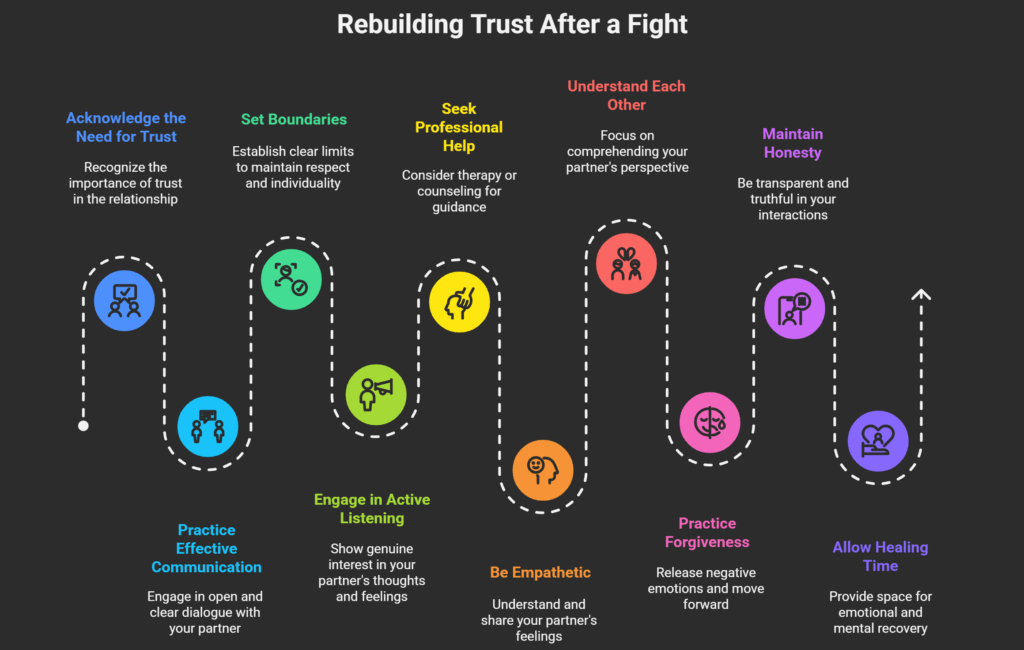
Some key Points to Consider When Rebuilding Trust:
- Understand that trust must be earned
- Be patient and give it time
- Communicate openly and honestly
- Be consistent and reliable
- Avoid blaming or becoming defensive
- Focus on rebuilding emotional intimacy
1. Effective Communication:
2. Set Boundaries:
- Setting boundaries is essential in any relationship.
- Establishing boundaries is crucial for maintaining a healthy relationship. Boundaries help maintain mutual respect, dignity, and individuality, while preventing manipulation and abusive behaviors.
- Remember, you deserve to be in a relationship where your partner respects and values your autonomy, individuality, and happiness. Don’t be afraid to take control of your life and make the difficult decision to walk away if necessary
3. Active Listening:
- Listening is just as important as communication. After a problem arises and you’re ready to resolve it, you must be willing to listen to your partner.
- Simply hearing them is not enough; you must actively listen to what they say. When you actively listen, you show that you’re interested in what your partner is saying and that you care about their thoughts.
- Moreover, active listening helps you understand things correctly.
4. Seek Professional Help:
- Improved Communication: Learning how to express yourself effectively and listen actively to your partner.
- Conflict Resolution: Developing strategies to resolve conflicts in a healthy and constructive way.
- Deeper Understanding: Gaining insight into each other’s perspectives, needs, and emotions.
- Strengthened Bond: Rebuilding trust, intimacy, and emotional connection.
5. Be Empathetic:
- It’s essential to understand that after a problem arises, both partners are affected. Being empathetic helps you understand your partner’s feelings and emotions better.
- You can only say you’ve truly learned your partner when you’re empathetic, can fully understand them, and think from their perspective.
- Growing from being sympathetic to being empathic largely depends on understanding your partner’s different goals
6. Understand Each Other:
- Often, after a problem arises, we’re not willing to understand our partner. Instead, we focus on justifying our side and proving that we’re not wrong.
- Meanwhile, we might overlook our partner’s emotional state and the distress they’ve experienced.
- Understanding each other after a problem helps to heal the relationship. Communicating through talking or even notes can be beneficial.
7. Forgiveness:
- Forgetting: Ignoring the hurt or neglecting the issue.
- Condoning: Excusing or justifying the hurtful behavior.
- Reconciling: Automatically going back to the way things were.
- Letting go: Releasing the negative emotions associated with the hurt.
- Moving forward: Focusing on healing and rebuilding the relationship.
- Creating a new beginning: Starting fresh, with a renewed commitment to communication, empathy, and understanding.
8. Honesty:
- Being honest is crucial when in a relationship. When you’re honest, you’re transparent with your partner, which helps avoid misunderstandings and other issues.
- Especially after a problem arises, it’s vital to handle things carefully. Make a conscious effort to be honest with each other.
9. Healing Time:
- After a problem arises, it’s essential to acknowledge and accept that emotional and mental healing takes time.
- Sometimes, after a fight, your partner might not want to talk to you or face you. In such situations, it’s crucial to give them space and time to heal without getting angry or frustrated. This allows them to process their emotions and reflect on the issue.
- Meanwhile, you also get time to sit down, think about the problems, and heal from the pain you’ve experienced.
Managing Emotional Triggers in Relationships
1. Identify the Emotion:
2. Understand Triggers:
3. Mindfulness/Self-Awareness Practices:
Self-awareness helps you understand your strengths and weaknesses. Through practices like mindfulness, you can enhance this skill and develop a positive personality.
Some Self-Awareness Practices Include:
- Mindfulness
- Journaling
- Feedback
- Introspection
- Emotional intelligence
4. Professional help
- A therapist can help you both identify the underlying causes of the conflict, teach you effective communication skills, and provide guidance on how to navigate future disagreements. They can also offer insights that may be hard to see from within the relationship.
- If you are struggling with arguments and you don’t know how to solve it scientifically then book a conflict resolution therapy with Oppam.
5. Create a Positive Environment:
- Emotions are closely linked to our environment. No matter how hard we try to stay positive, a negative environment can lead to various problems.
- A positive environment, on the other hand, supports emotional well-being and emotional regulation.
Need to Talk to Someone?
1.Communication and Emotional intelligence
1.Active Listening:
2. Use 'I' Statements:
3. Practice Empathy:
4. Be Clear and Concise:
5. Avoid Assumptions:
6. Show Appreciation:
1. Stay Calm
2. Avoid Taking It Personally
3. Give Them Space
4. Use "I" Statements
5. Focus on the Issue, Not the Person
6. Seek Professional Help
1. Acknowledge the Imbalance
2. Communicate Your Feelings
3. Set Boundaries
4. Re-Evaluate Priorities
5. Seek Support
6. Consider Couples Therapy
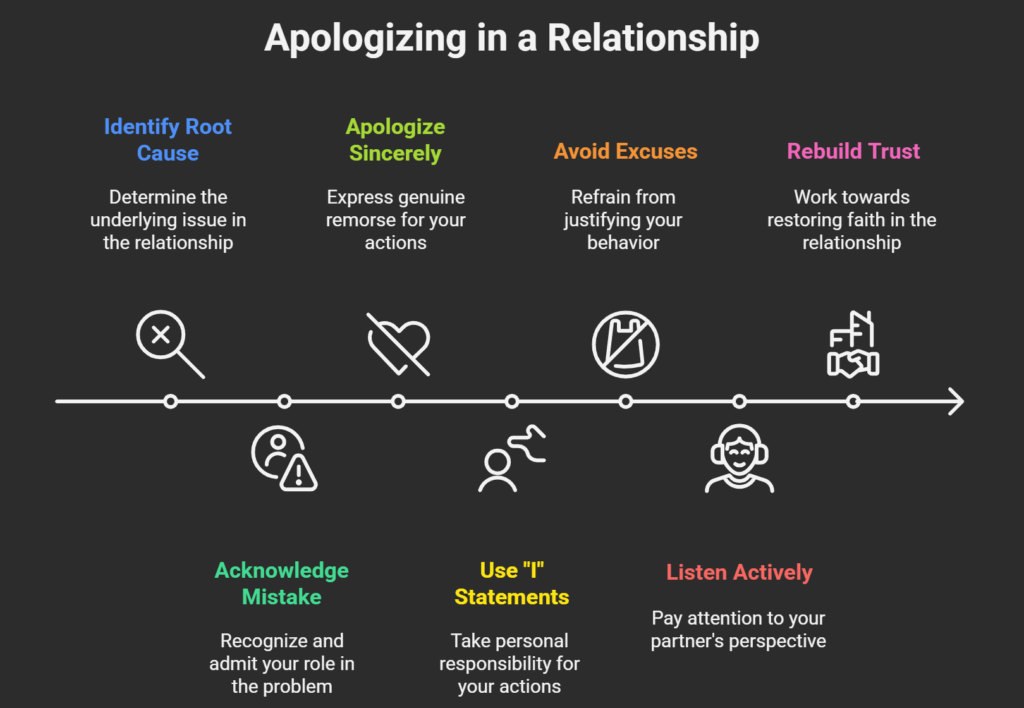
Best Phrases Use in a Sincere Apology
- “I was wrong to”… Acknowledge your mistake and take responsibility.
- “I apologize for”… Clearly state what you’re apologizing for.
- “I regret”… Express remorse for your actions.
- “I hurt you, and I’m truly sorry”… Acknowledge the pain you caused.
- “I understand how my actions affected”… you Show empathy and understanding.
- Be genuine and sincere in your apology.
- Use “I” statements to take ownership of your actions.
- Follow through on your commitments to rebuild trust.
- Avoid making excuses or justifying your behavior.
- Listen actively to the other person’s perspective.
2. Trust, boundaries, and jealousy
How to Build Trust in a Relationship ?
1. Past Experiences
2. Betrayal
3. Insecurity and Low Self-Esteem
4. Communication Breakdown
5. Dishonesty and Lack of Transparency
6. Abuse of Power or Control
1. Recognize and Accept Your Feelings
2. Identify the Root Cause
3. Communicate Openly with Your Partner
4. Build Trust
5. Focus on Self-Improvement
6. Develop Emotional Intelligence
7. Seek Professional Help
Feeling Overwhelmed?
Oppam Therapist Wherever You Are
Setting Boundaries:
- Discuss and Agree: Talk to your partner about your concerns and boundaries. Come to a mutual understanding about what is and isn’t acceptable.
- Establish Guidelines: Set clear guidelines for communication with their ex, such as frequency, content, and context.
- Define Emotional Boundaries: Discuss what emotional involvement is and isn’t acceptable.
Building Trust:
- Open Communication: Encourage open and honest communication about their interactions with their ex.
- Transparency: Establish a culture of transparency, where your partner feels comfortable sharing information with you.
- Trust-Boosting Actions: Focus on building trust through actions, such as following through on commitments and being reliable.
- Address Insecurities: Work together to address any insecurities or trust issues that arise.
Red Flags:
- Secrecy: If your partner is secretive about their communication with their ex.
- Emotional Intimacy: If your partner is emotionally intimate with their ex, such as sharing personal feelings or desires.
- Disrespect: If your partner disrespects your boundaries or feelings regarding their communication with their ex.
Signs of a Controlling Partner and How to Regain Your Independence in a Relationship
Are you wondering if your partner is controlling or toxic?
Recognizing the signs of a toxic relationship can take time, but once you acknowledge them, it’s crucial to decide how to move forward. You may need to learn how to reclaim your independence and break free from feelings of suffocation. Don’t be afraid to seek help – relationship counseling or couples therapy can be a game-changer.
Recognizing the signs of a controlling partner is crucial to maintaining your independence and well-being in a relationship. Here are some common signs and steps to regain your independence:
- Emotional Manipulation: They use guilt, anger, or self-pity to control your emotions and actions.
- Isolation: They limit your contact with friends, family, or outside activities.
- Constant Criticism: They criticize your thoughts, feelings, or actions to erode your self-esteem.
- Possessiveness: They become overly possessive or jealous, restricting your freedom.
- Decision-Making Control: They make all the decisions, dismissing your opinions or preferences.
- Monitoring and Surveillance:They track your movements, check your phone or computer, or monitor your activities.
- Threats and Intimidation:They use threats or intimidation to control your behaviour.
How to set boundaries in a relationship ?
1. Identify Your Limits
2. Communicate Your Boundaries
Share your boundaries clearly and assertively with your partner. Use “I” statements to express your feelings and avoid blaming or accusing your partner.
3. Establish Consequences
Discuss and agree upon consequences for when boundaries are not respected. This can help prevent misunderstandings and ensure accountability.
4. Respect Each Other's Boundaries
Remember that boundaries are a two-way street. Respect your partner’s boundaries and expect them to respect yours.
5. Be Consistent
Consistency is key when setting boundaries. Ensure you’re enforcing your boundaries consistently to avoid confusion.
6. Seek Support
If you’re struggling to set boundaries or if your partner is not respecting your boundaries, consider seeking support from a therapist or counselor. If you are struggling with a toxic relationship then consider Oppam for your mental health support.
3. Lifestyle Conflicts and External Stressors
Ever noticed how lifestyle conflicts and external stressors can take a toll on your relationships?
Financial stress, work-related tension, and other external factors can create conflicts and put pressure on your relationship. To avoid breakdowns, it’s crucial to identify these issues and address them in a healthy way. By striking a balance between work and life, you can better navigate these challenges and nurture a stronger, more resilient relationship.
How Financial Stress Leads to Relationship Conflicts ?
Financial stress can be overwhelming, and sometimes we might not want to burden our partner with it. But keeping it bottled up can create tension that can lead to significant relationship problems. If we don’t address it properly, it can escalate into bigger issues and even lead to the demise of the relationshi.
Financial stress can significantly impact relationships, leading to conflicts and straining the bond between partners. Here are some ways financial stress can affect relationships:
1. Increased Arguments
Financial stress can lead to more frequent and intense arguments. Couples may disagree on spending habits, budgeting, and financial priorities.
Financial stress can cause emotional distress, including anxiety, depression, and feelings of overwhelm. This emotional toll can affect relationships, leading to irritability, mood swings, and withdrawal.
2. Lack of Intimacy
Financial stress can lead to a decrease in intimacy and romance. Couples may feel too stressed or anxious to connect on an emotional or physical level.
3. Resentment and Blame
Financial stress can create resentment and blame between partners. One partner may feel that the other is not contributing enough or is spending too much.
4. Feelings of Shame and Guilt
Financial stress can lead to feelings of shame and guilt, particularly if one partner feels responsible for the financial struggles.
How to Deal with a Partner Who Priorities Work Over the Relationship
It’s crucial to have an open discussion about what matters most. If your relationship isn’t getting the attention it deserves, conflicts will arise. Finding a balance between work and love life is key. Communicate your feelings, and be willing to adapt to changing situations. Sometimes, work demands more attention, and other times, your relationship needs more focus. Being flexible and open with your partner is vital.
Dealing with a partner who prioritizes work over the relationship can be challenging and emotionally draining. Here are some steps to help you navigate this situation:
1. Communicate Your Feelings
Share your feelings and concerns with your partner. Be specific about how their prioritization of work is affecting you and the relationship.
2. Understand Their Perspective
Try to understand your partner’s perspective and the reasons behind their prioritization of work. Are they under pressure to meet deadlines or facing financial stress?
3. Set Boundaries
Establish clear boundaries and expectations for your partner’s work-life balance. Discuss specific times for work and personal life.
4. Schedule Quality Time
Plan regular quality time together, doing activities you both enjoy. This can help your partner reconnect with you and the relationship.
5. Reevaluate Priorities
Encourage your partner to reevaluate their priorities. Ask them to consider the long-term impact of their work-centric lifestyle on the relationship.
6. Seek Support
Consider seeking support from a couples therapist or counselor. They can help you both communicate more effectively and work through underlying issues. Oppam is always with you and Oppam will be an excellent mental health companion.
7. Foster a Healthy Work-Life Balance
Work together to establish a healthy work-life balance. Encourage your partner to take breaks, practice self-care, and prioritize personal time.
When You and Your Partner Have Different Life Goals: How to Find Common Ground
Being in a relationship means navigating different goals, aspirations, and priorities with your partner. To make it work, you need to have open and honest conversations about your individual desires, dreams, and career plans. If you don’t, you might find yourself growing apart, struggling to find quality time together, and facing relationship challenges. Finding that middle ground and working together towards a healthy relationship takes effort, but the payoff is a stronger, more fulfilling connection
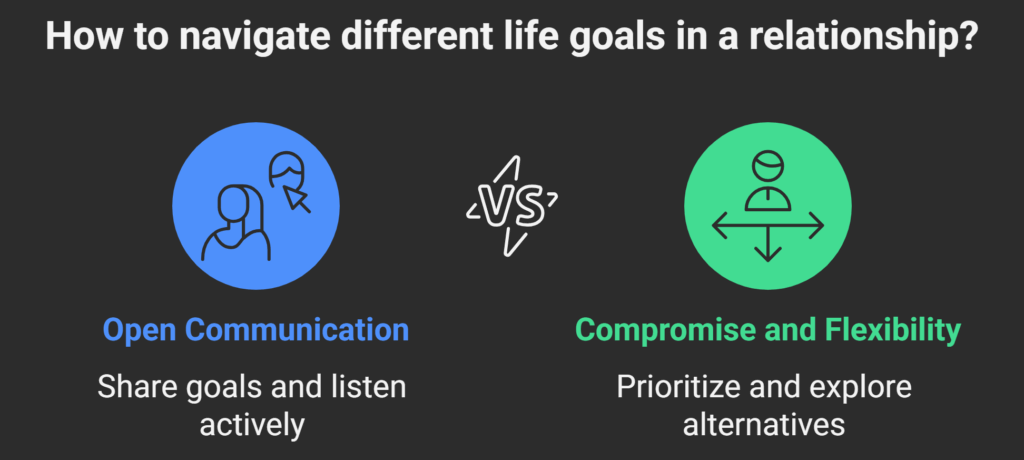
When you and your partner have different life goals, finding a middle ground can be challenging but not impossible. Here are some steps to help you navigate this situation:
1. Communicate Openly
Share your goals, aspirations, and concerns with each other. Listen actively and try to understand each other’s perspectives.
2. Identify Common Values
Look for common values and principles that underlie your goals. This can help you find a shared foundation for compromise.
3. Prioritize and Compromise
Prioritize your goals and be willing to compromise. Consider finding alternative solutions that meet both partners’ needs.
4. Explore Alternative Scenarios
Brainstorm alternative scenarios that could work for both partners. Be creative and open-minded.
5. Seek Common Ground
Focus on finding common ground rather than trying to change each other’s minds. Look for areas of agreement and build on those.
6. Consider a Temporary Compromise
If you can’t find a long-term solution, consider a temporary compromise. This can give you both time to reassess and adjust your goals.
7. Seek Professional Help
Need to Talk to Someone?
4. Conflict resolution in tough situations
Relationships can be tough, and sometimes you’ll face situations that are unbearable or impossible to move forward from. Infidelity, massive conflicts, or trauma can leave you feeling stuck. It’s essential to recognise that not everything is your fault, but rather than playing the blame game, focus on finding healthy ways to cope.
This might mean seeking trauma-based counselling, relationship therapy, or online support. By confronting these challenges head-on and without fear, you can transform your life and relationship for the better
How to move forward after a partner cheats
Finding out that your partner cheated can be incredibly traumatic. The betrayal by someone you love and trust can be emotionally devastating. But here’s the thing: you can’t let self-blame hold you back. You need to decide whether to stay in the relationship or end it, and that’s entirely up to you.
When you’re feeling lost and confused, consider seeking help from a relationship counselor, couple’s therapist, or online counseling services. They can provide guidance and support to help you move forward
Moving forward after a partner cheats can be a challenging and emotional process. Here are some steps to help you navigate this difficult situation:
1. Allow Yourself to Grieve
Acknowledge your feelings and permit yourself to grieve the loss of trust and the relationship as you knew it.
2. Seek Support
Reach out to trusted friends, family, or a therapist for emotional support and guidance.
3. Communicate with Your Partner
If you decide to stay in the relationship, have an open and honest conversation with your partner about the infidelity. Discuss the reasons behind their actions, and work together to establish a plan for rebuilding trust.
4. Evaluate the Relationship
Take time to reflect on the relationship and consider whether it’s healthy and sustainable for you. Ask yourself:
-Was this a one-time mistake, or a pattern of behaviour?
– Has my partner taken responsibility for their actions and shown remorse?
– Am I willing and able to work through the underlying issues that led to the infidelity?
5. Rebuild Trust
Rebuilding trust takes time, effort, and commitment from both partners. Consider:
- Regular counseling sessions. Book an online session with Oppam.
- Increased transparency and communication
- Establishing boundaries and consequences for future infidelity
6. Consider Couples Therapy
Couples therapy can provide a safe and supportive environment to work through the underlying issues that led to the infidelity. Are you looking for the best therapy? If so, Oppam is the best option for you..
How to Reconnect and Strengthen Your Relationship After a Rough Patch
Recovering from a major issue in a relationship can be tough. Don’t expect things to go back to normal overnight. Healing and rebuilding take time and effort. Your partner needs to understand your commitment, trust, and willingness to change.
This process requires hard work, but it’s doable. Setbacks like these are common in relationships, but they can affect the relationship’s stability. So, it’s essential to handle them with care and sensitivity to ensure a healthy and positive outcome.
Reconnecting and strengthening your relationship after a rough patch requires effort, commitment, and a willingness to work together. Here are some steps to help you reconnect:
1. Acknowledge and Accept
Acknowledge the rough patch and accept that it’s a normal part of any relationship. Avoid blaming or denying the issues.
2. Communicate Openly
Communicate openly and honestly with each other. Share your feelings, concerns, and needs. Listen actively and empathetically.
3. Identify the Root Cause
Identify the root cause of the rough patch. Was it a specific incident, a communication breakdown, or a deeper issue? Understanding the root cause can help you address it.
4. Schedule Quality Time
Schedule quality time together, doing activities you both enjoy. This can help you reconnect and strengthen your bond.
5. Practice Forgiveness and Understanding
Practice forgiveness and understanding. Let go of grudges and resentments. Work towards understanding each other’s perspectives and needs.
6. Seek Professional Help
Consider seeking professional help from a couples therapist or counselor. They can provide guidance, support, and tools to help you reconnect. Need someone to talk to? Oppam is here to listen and offer support. Consider Oppam is your best bet for a supportive conversation!”
How past trauma affects relationships and how to heal together
Unresolved traumas from past relationships or experiences can spill over into your current relationship. You might find it tough to fully commit, struggle to communicate openly, or get triggered emotionally from time to time. Trust issues can also creep in.
To move forward, it’s crucial to address these concerns in a healthy way. Look into trauma-based therapy or online counseling to help you work through these challenges
Past trauma can significantly impact relationships, causing emotional distress, trust issues, and intimacy problems. Healing together requires a deep understanding of the trauma’s effects and a willingness to work through the challenges.
Effects of Past Trauma on Relationships
1. Emotional Triggers: Traumatic experiences can create emotional triggers, leading to intense reactions and mood swings.
2. Trust Issues: Trauma can make it difficult to trust others, leading to feelings of insecurity and anxiety in relationships.
3. Intimacy Problems: Trauma can cause emotional and physical intimacy issues, making it challenging to form and maintain close relationships.
4. Shame and Guilt: Trauma can create deep-seated shame and guilt, affecting self-esteem and relationships.
5. Creating a Safe Space: Create a safe and comforting environment, free from triggers and stressors, where both partners feel secure and supported.
Hey, don’t be too hard on yourself if you feel like you’re struggling in relationships. Instead, let’s try to figure out what’s going on and find a solution that works for you.
If you’re looking for some extra support, Oppam is an amazing mental health team in Kerala that offers online counseling services.
Hey, don’t brush off your problems or ignore them. Take some time to think about how to tackle them head-on.
You deserve a happy and healthy relationship, so let’s work on making that a reality!
